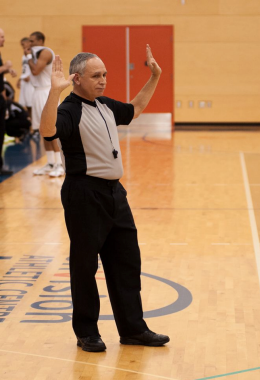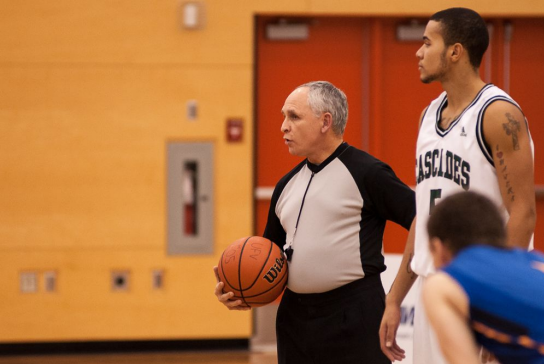Print Edition: November 14, 2012
 Age: 59
Age: 59
Officiating For: 28 years
Sports Officiated: Basketball, baseball, soccer
Day Job: Insurance underwriter
What levels of the sport have you officiated at?
CIS of course, some high school games, PACWEST, which is the junior colleges, and I’ve done a lot of national tournaments, 10 national tournaments, at the college level and CIS level.
How did you get into officiating?
I’ve refereed soccer, I did that for quite a long time, and I also did some basketball refereeing when I was in high school. I played senior ball and reffed junior games and grade eight games. So it’s hard to say how I really got into it, it was something I just really enjoyed doing. I coached soccer and reffed soccer, and then I just really like basketball a lot, so I decided to give it go.
You say you enjoy this, even though most people find officiating to be a very scary thing. So why did you get into this?
That it is interesting, a lot of people do find this scary, even players. I think you have to have a certain kinds of personalities and mentalities. One of them is that you have to be a very easy-going – that really is a critical piece in officiating. You have to learn to be mellow, even-tempered, not get rattled . . . we’re out there making sure everything is done properly and resolving issues . . . the other reason [I got involved] is that after high school I knew I wasn’t tall enough and didn’t have some of those attributes to play any further, so officiating helped me stay involved.
Which sport is most difficult to officiate: basketball, soccer or baseball [having officiated all three]?
No question basketball. Soccer you are out there by yourself for the most part . . . and you have a lot of time to make a decision. There’s not a lot of off-ball stuff in soccer. In basketball you have 10 people in a tiny space, moving, there’s a lot more chess type plays that go on . . . there’s so many variables.
How does someone rise to become a CIS referee?
Really what it is, is someone needs to have a real good understanding of the game, have a good feel for it. If you are athletic, if you’ve played basketball, and you understand the nuances of the game, that’s going to help you. And then you’ve got to have some nerve, some guts to blow the whistle with some authority, and that’s confidence as well. And once you gain some of those kinds of things you start doing high school games and people notice that you’re fairly competent at that level, and then someone within our own group will say “you really should have a look at this guy.” Nowadays, a lot of officials go to referee camps [as well] . . . you’re taught all the things about the techniques and floor position and a lot of other intangibles—court presence, how to manage the game—and during those times as well, you have other individuals which watch you . . . it’s really throwing you into the deep end and seeing how you do.
In the CIS I’ve heard unusual things about how one of the three refs for a game is always flown in from out of town. How does the CIS work and who makes the regulations?
It’s not so much the CIS as Canada West. The conference has a management group, and that group hires a supervisor, and that supervisor then hires all the referees. So he contacts us, offers us a contract and then we go on to a web-based system and receive our assignments . . . so at every game there has to be a traveller. Tonight I’m the local official, I only live 10 minutes from here, but another official has to be the traveller.
The purpose of that would be?
There’s more than one purpose. The coaches don’t like to see the same referees all the time, and the referees don’t like to see the same teams all the time. As referees we need to go into it with an open mind, we can’t have any biases or prejudices from what happened the night before or the week before. So the less we see a team, the more fair or unbiased we are about it. And when we work with different [officials] that strengthens us as a group. And the third thing is that coaches will think that this person is from this area so they’re favouring . . . from my perspective I’ve watched a lot of games and officials don’t do that. But the perception is there. To avoid the perception, this is a good compromise.
Run me through a normal working night outside of the games.
Well the first thing is that prior to me coming here, most of us pack our bags two to three days in advance . . . especially if you’re going out of town. So we usually come and meet just over an hour before the game starts, the three people who are doing the game . . . and then start talking about things—about the teams, who the players are—then we talk about rule changes, make sure we’re all on the same page. Then we go out on the floor 15 or 20 minutes before the game and observe the teams. Then one of us, the crew chief, will go over and check the score sheet to make sure the 10 players are all signed off, that all the coaches’ names are on there and that they’ve signed the score sheet and approved it.
And then after the game you head back to the change room and post guards outside (laughs)?
No, everyone is very good. They know the referees’ room is out of bounds, so no coaches ever come. At the high school level you get people who don’t quite understand and they’ll want to talk to the referees, but in CIS that never happens . . . So we go back to the dressing room and then we’ll do a post-game. We’ll talk about what happened in the game – the good things, and what we think we didn’t like and what we could have done better. We give good feedback to each other and no one takes offence to it. One of the other officials will say “Jim, I didn’t like something you did tonight” and we’ll talk about it. Then after the game we’ll go home and watch the game tape, we usually watch it once or twice.
Three officials out there on the court, what are they all watching during the game? In football each of the officials have assigned tasks, in basketball is it the same?
The difference between [basketball] and any other sport, is that the three officials all have a role to pay prior the game and [immediately before] the ball is tossed. After that all of us are equal, and we rotate our positions . . . the play and where the ball is dictated [the rotation]. If the ball is on one side of the floor you always have two officials over there, if it moves to the other side of the floor we have two officials over there, so that’s what rotates. No one stays in one spot like in football.
During the game what are you looking for (to call) and what habits do you cultivate to make officiating easier?
The most important thing we’re looking at is to have the game flow. We want the best players to play and not be hindered, so that’s what we’re looking for: things that players are doing to hinder the better players, holding them, impeding their progress. We always look to see how rebounding is if things start to get rough. Post play is a huge aspect . . . which is why one official is always near the post players, because you want him communicating with the post players and ensuring nothing gets to rough down there.
Post play has changed a lot in the last 10 to 15 years. You’ve obviously seen shifts over your 28 years, so can you speak a bit about what’s changed in officiating post play?
I think for the most part it’s that the game has become more physical. Not physical dirty, but good physical play. The players like that. A lot of times during the game I’ll say to the post players “how are you guys feeling? How’s everything going?” and if they say to me “hey, we like the way things are going” then we’ll let things go . . . if they don’t step over the line then I’m gonna let things go. So we’re seeing a defender allowed more contact now and we let the post player back down the defender as long as he’s not displacing him.
We do let a lot more go because they’re better athletes, they’re better conditioned than they were years ago, and if you look at the CIS, the post players for the most part are pretty good-sized guys. A guard doesn’t like that, a guard wants hands-off; he’s a lot more finesse. But the post players are like fullbacks, they like that good physical play.
When you have a 50–50 call to make, what goes through your mind?
You have to make the decision for what you see. If you haven’t seen the whole thing and you have to blow your whistle to make a decision then you have to call what you’ve seen, and if the coaches ask, you have to be honest. In a three person game, there’s a lot more ability to see the entire play. In a two person game it’s a lot more difficult; there’s a lot of educated guessing going on.
A lot of people believe in the power of the crowd or an aggressive coach to sway or intimidate the referee. Is there some truth to that?
To me that’s total mythology, it doesn’t happen. For myself, I hardly even hear the crowd, and as far as the coach goes, if one coach is more vocal than the other, that has no influence on me. Now, if there’s a brand new referee maybe that will influence them. The only time, and we talk about this in the pre-game, is if the coach makes a comment and the crowd makes a comment and you’ve made a call, especially a directional call, then we say [to each other to] have enough courage to think “I might have got it wrong” and go talk to your partners.
Like the Olympic ref should have done during the Canada-U.S. women’s soccer semifinals? I bet the soccer referee in you just . . .
Oh the soccer ref in me, I tell you when I saw that play, I cringed. A good example is, if you watch a CIS game, notice how many times “three in the key” is called. It’s very, very seldom. In high school it’s called more because we have a lot younger referees and they think that’s a big rule, but you’ll very seldom hear a coach yell for it. The only time they’ll yell for it is if one person towers over another and takes total advantage, that’s why the rule is there.



